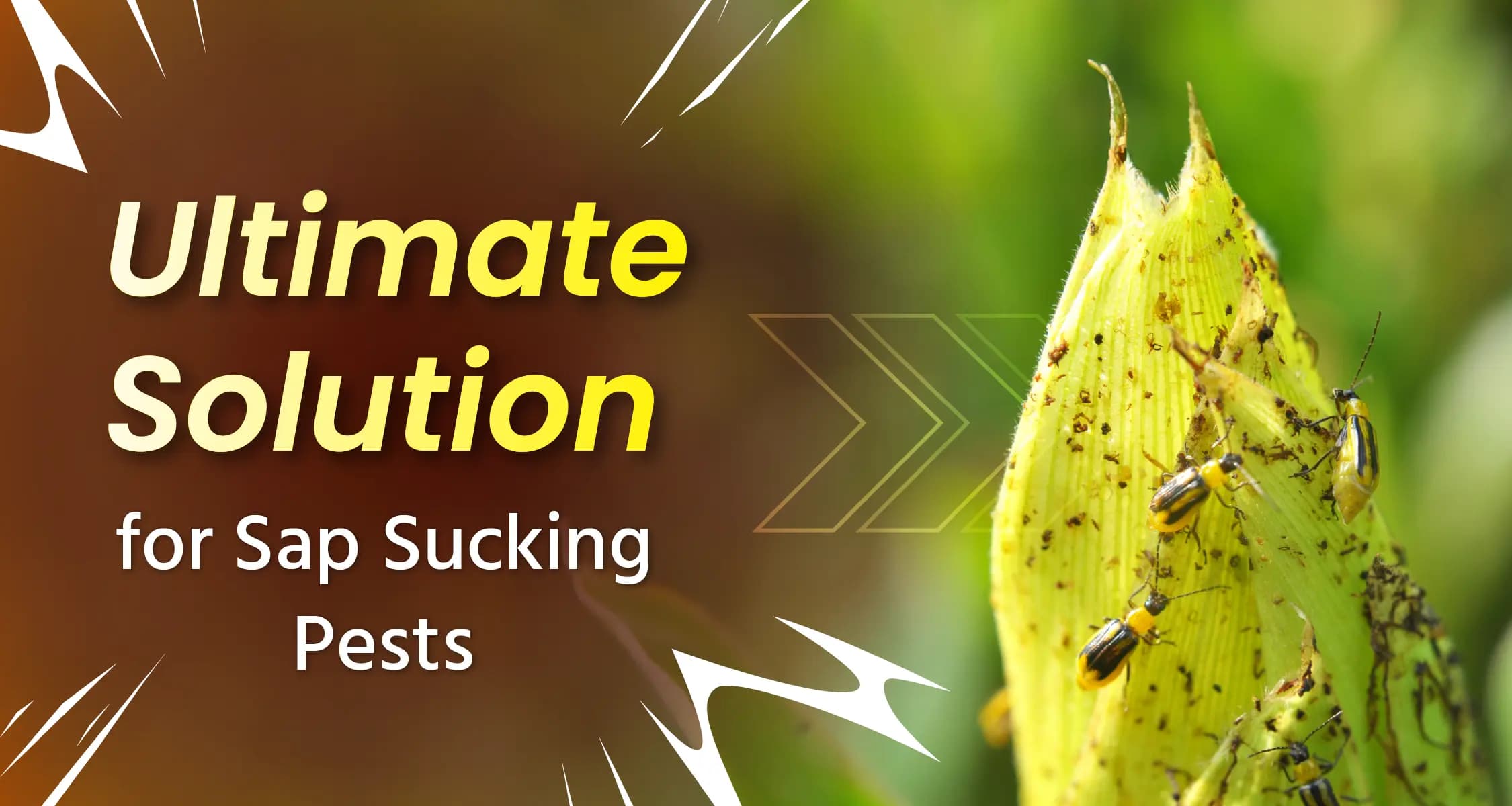पोस्ट विवरण
Benefits of Biopesticide 'Brahmastra' and Its Method of Preparation

Benefits of Biopesticide 'Brahmastra' and Its Method of Preparation
There is a high incidence of pests like thrips, white flies, aphids, jassids, etc. in crops. Due to their small size and being in groups, they cause a lot of damage to the crop in a very short time. Many types of pesticides are available in the market to get rid of these pests. However, the chemicals present in them are very harmful to the soil and environment of the fields. In such a situation, bio-pesticide 'Brahmastra' prepared from cow urine and other natural products is emerging as a better option.
Damage Caused by Sap-Sucking Pests
- Sap-sucking pests extract sap from the tender branches, flowers, tender fruits, and leaves of plants.
- The leaves of plants affected by sap-sucking pests turn yellow.
- Often, the affected leaves begin to curl upwards or downwards.
- The infestation of these pests hampers the development of plants.
- The plants start to wither and dry up.
- There is a significant decrease in crop yield.
Various Methods of Controlling Sap-Sucking Insects
- Use of Sticky Traps: Deploying sticky traps in the field proves beneficial for controlling flying sap-sucking insects such as whiteflies, aphids, and thrips. Use 4-6 sticky traps per acre of land. Regularly inspect the sticky traps installed in the field at intervals of a few days and replace them when necessary.
- Use of Pheromone Traps: Pheromone traps, also known as scent traps, can be employed for controlling pests. Different types of lures are used to attract male insects. Upon approaching the lure, the male insects get trapped, thereby preventing an increase in the pest population.
- Utilization of Chemical Pesticides: Various types of chemical pesticides are available for pest control. This method offers an easy solution for pest control, but prolonged use can lead to a decrease in soil fertility due to the presence of harmful chemicals. Additionally, the use of chemical pesticides increases the overall cost of farming.
- Use of Biopesticides: Biopesticides can prove to be a better alternative for controlling sap-sucking insects that cause damage to crops. Farmers can easily prepare biopesticides at home with minimal cost. Their use also does not have any harmful effects on the soil, plants, or our health. Biopesticides offer a sustainable solution to pest management, ensuring crop protection without compromising environmental or human health.
What is Brahmastra?
Brahmastra is a type of bio-pesticide prepared from natural elements, which can be easily made at home. Its application in crops is highly effective in controlling pests such as thrips, whiteflies, aphids, and jassids. This bio-pesticide offers a sustainable and eco-friendly solution for pest management, contributing to the health and productivity of agricultural produce.
Benefits of using bio-pesticide 'Brahmastra' in crops:
- It serves as an excellent option for controlling pests.
- Due to its natural composition, it does not adversely affect soil fertility.
- It reduces costs incurred in agriculture.
- This leads to a decrease in the use of harmful chemical products.
- Improves crop yield and quality.
- The use of bio-pesticide 'Brahmastra' is also environmentally safe.
Ingredients required to prepare the bio-pesticide 'Brahmastra':
- Cow urine: 10 liters
- Neem leaves (crushed): 5 kilograms
- White datura leaves (crushed): 2 kilograms
- Custard apple leaves (crushed): 2 kilograms
- Karanja leaves: 2 kilograms
- Guava leaves: 2 kilograms
- Castor leaves: 2 kilograms
- Papaya leaves: 2 kilograms
- Clean cloth (for straining the prepared mixture)
- A large container for boiling cow urine and leaves.
The process of making bio-pesticide 'Brahmastra' involves the following steps:
- Choose leaves from any 5 plants among neem, white datura, custard apple, karanja, guava, castor, and papaya, as per the specified quantity.
- Boil these leaves in cow urine until approximately 4 boils are achieved.
- Let the mixture cool down after about 4 boils.
- After 48 hours, strain the cooled mixture using a clean cloth. The bio-pesticide 'Brahmastra' is now ready for use.
- For pest control, mix 2-3 liters of 'Brahmastra' in 100 liters of water and spray it on crops.
- This mixture can be stored for up to 6 months.
Have you ever used the bio-pesticide 'Brahmastra' in your crops? Share your response and experiences with us in the comments section below. For more such insightful content, make sure to follow the 'Desi Jugaad' channel now. If you find this information valuable, don't forget to like and share this post. Your engagement and support mean a lot to us!
Frequently Asked Questions (FAQs)
Q: What are bio-pesticides?
A: Bio-pesticides are substances prepared from natural materials such as animals, plants, bacteria, and some minerals, used in agriculture to control pests and diseases. They are considered a safe and environmentally friendly alternative compared to chemical pesticides.
Q: How to prepare bio-pesticides at home?
A: Various bio-pesticides can be easily prepared at home using natural ingredients. These include neem oil, garlic-based spray, and chili-based spray. For repelling pests like ants, aphids, and caterpillars, a mixture of 2 tablespoons of chili powder with 1 liter of water and a few drops of liquid dish soap can be applied. Additionally, control over thrips, aphids, and whiteflies can be achieved by using a solution of soap and water.
Q: Which is the most widely used bio-pesticide?
A: Neem oil is predominantly used among bio-pesticides. The increasing use of neem oil has led many major companies to sell products made from neem oil today. Due to its numerous benefits, neem oil has gained popularity as a natural and effective solution for pest control in agriculture.
Q: What is the difference between bio-pesticides and synthetic pesticides?
A: Bio-pesticides are derived from natural sources such as plants, bacteria, and fungi, and used in agriculture to control pests. They target specific pests, destroying or repelling them. Conversely, synthetic pesticides are chemically synthesized and are used to kill or control pests. Synthetic pesticides can also harm beneficial insects, pollinators, birds, and animals. On the other hand, bio-pesticides are considered less harmful to the environment and beneficial insects, pollinators, birds, etc., compared to synthetic pesticides.
जारी रखने के लिए कृपया लॉगिन करें

फसल चिकित्सक से मुफ़्त सलाह पाएँ
